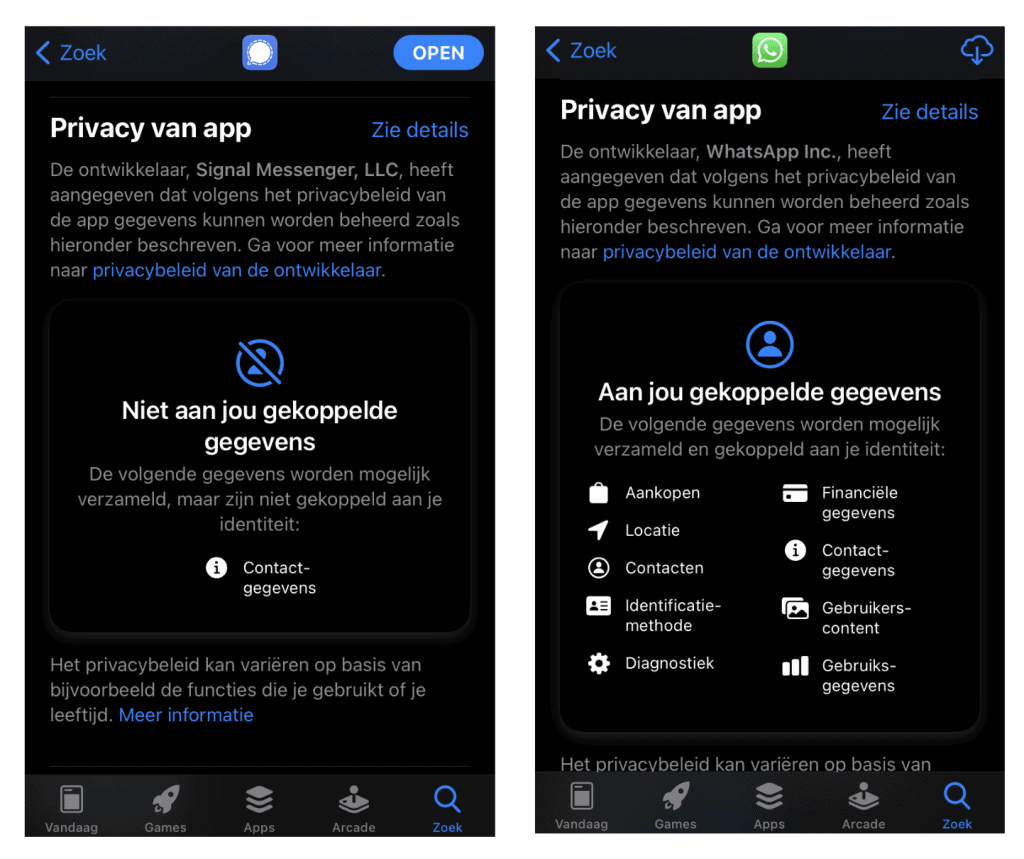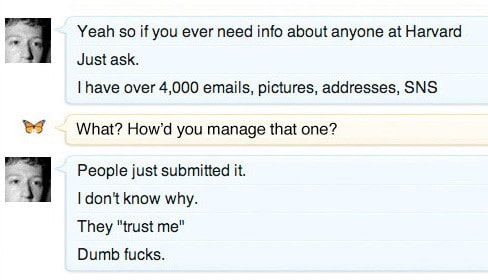Early last year, I deleted WhatsApp (from Facebook) from my phone. Not because I am contact-impaired, but because WhatsApp is increasingly invading the privacy of its users. These were the 5 main reasons for me.
Update Jan 2023
1. WhatsApp collects (a lot of) metadata
WhatsApp states that they do not read or listen to the content of your communications and only collect metadata. Thus, as a consumer, you are put at ease until you realize exactly what metadata is. The fact that Whatsapp uses end-to-end encryption gives a false sense of privacy.
"Metagegevens vertellen je absoluut alles over iemands leven. Als je genoeg metadata hebt, heb je de inhoud van een bericht niet nodig"
Steward Baker - Homeland Security Tweet
Metadata has always been a fuzzy, not-so-understood term. Metadata is not literally the content of your text messages, but the data about your communications. It is actually a record of your activities. So to know a lot about a person, Facebook does not need to directly read the content your WhatsApp messages, Facebook has enough with your metadata.
Metadata provides enough context to know the most intimate details of your life.
WhatsApp collects information such as when, where, how long and with whom you communicate. In addition, the app collects information about your OS, browser information (think search history on synced devices), IP address, mobile network data, purchases, location, financial data, user content and your contacts.
When you install and open WhatsApp just once, it collects data such as your operator, your phone’s unique identifier, your approximate location (city where you are), what apps you have installed, etc.

2. Your data is (are) not secure
With all the facts on the table, it is safe to assume that your data (metadata) is stored on WhatsApp (Facebook) servers and that your communications within the app are permanent.
European WhatsApp users are subject to the privacy terms of WhatsApp Ireland, a subsidiary. GDPR may offer European users more protection, but Facebook is not exactly the good boy in the class. Facebook will continue to look for loopholes.
European Commission staff may no longer use WhatsApp or other chat services for mutual communication. For the sake of safety assurance. At the United Nations, high-ranking officials are not allowed to use WhatsApp because of security concerns.
if you back up your WhatsApp chat history with iCloud or Google Drive, your conversations are sent unencrypted to Apple's or Google's servers. This is a privacy risk.
3. WhatsApp is owned by Meta
Meta (formerly Facebook) derives most of its revenue from exploiting user data. In addition, the company regularly conducts studies on the behavior of its users. Facebook lets users involuntarily and secretly participate in these experiments that are unethical and creepy. This was reason enough for me to stop using Facebook products.
Here are a few examples:
Emotional influence on a large scale
Facebook’s data scientists manipulated the news feeds of nearly 690,000 users, showing some of them more positive and others more negative updates. All this to see how it affected users’ moods.
Self-censorship
Facebook saved any message of more than five characters that was not posted within 10 minutes. 71 percent of users engaged in “self-censorship.” She typed comments they never posted. Many others edited their posts before sending it to the social network. The fact that Facebook has a record of not only what you post, but also what you don’t post, is troubling to say the least.
Emotional influence of friends
Facebook tried to find out if one user’s emotional state affects another user’s disposition. They looked at one million users’ status updates, both positive and negative, and then looked at the reactions of those users’ 150 million friends.
4. Meta and privacy unfortunately do not mix
Meta has an “ad-based” revenue model. Facebook bought WhatsApp for $19 billion. This investment must, of course, yield a return. Even if Zuckerberg (CEO of Facebook) really wanted to transform his company into a privacy-friendly organization, the revenue model does not allow it.
5. There is a very good alternative to WhatsApp
Signal is a secure and privacy-friendly chat app and works similarly to Whatsapp.
- Open Source
- A desktop version is available
- End-to-End encryption
- User-friendly
- Privacy Friendly
- More and more people are starting to use Signal
Most people are still on WhatsApp now, and it seems challenging to persuade your friends to use Signal. That’s why I don’t try to “convince” my family and friends (anymore). I just stopped using WhatsApp. If someone needs something from me, I indicate that they can reach me via Signal. I tell them that Signal works the same as WhatsApp and is free. Besides, your friends don’t have to stop using WhatsApp right away if they don’t want to. Signal and WhatsApp are fine to use side by side.
Bonus: reason to quit WhatsApp and Facebook
Let’s also not forget this conversation between Mark Zuckerberg and a college friend in 2004.



